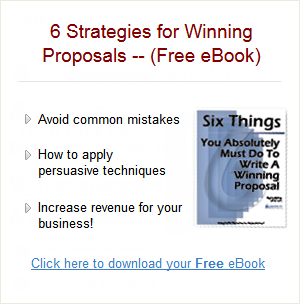In another article in these pages, we discuss how you can use the Freedom of Information Act (FOIA) to help get a leg up on the competition. We have found a number of FOIA-related sites that can help you navigate the FOIA process.If you want a guide to the Freedom of Information Act, check out
In a prior article we tied you into some Freedom of Information Act (FOIA) sites you can visit to help you get an edge on the competition. Here are some more links that can help you in your proposal development efforts. If you know of any more, drop us a line and we’ll post ’em. General Procurement
There are many lessons to be learned by examining winning proposals. And its getting easier to get copies of winning proposals. In fact, in some jurisdictions winning proposals and the related documentation are available on demand. This change was not made by procurement officials looking to gain popularity with the supplier community. Typically, the easy
Here’s something we can all agree on: There’s almost always a time-crunch when it comes to writing proposals. Maybe the client doesn’t give us much lead time (two weeks; a week; three days). Or maybe the RFP sits on someone’s desk for too long before a decision is made to go for it. Whatever the
In a recent article we talked about how a chaotic approach to writing a proposal can erode the quality. We also told you we’d show you how to impose some order on the chaos. Check out this flow chart that shows these steps in the process. You can tweak it to fit your situation, but
As we’ve discussed already, it is important to come up with a set of themes that run throughout the proposal. But how do you come up with these themes? You develop them during a win strategy session. This meeting, held at the beginning of the proposal effort, concentrates on four areas: Step 1: Identify client
Everybody I have ever talked to agrees that it’s important to do a lessons learned exercise after a proposal. Hardly anybody ever does. “No time right now,” they say. “Too busy,” they say. “We’ll get to it later,” they say. And they don’t. And guess what? They go out and make the same mistakes on the
The client has made his decision, and you have either won or lost. And after all those days/weeks/months you have worked on the proposal, the last thing you want to do is spend any more time with it. But there is one more thing: request and attend a loss or win debrief with the client.
You need a team of people to write a successful proposal. The emphasis here is on “team.” Each of the team members has a role to play in the process. And each team member’s strengths compensate for the other team members’ weaknesses. The most important team member is the proposal leader. In some organizations she
http://idm.internet.com/features/idm0398-pm1.shtml

